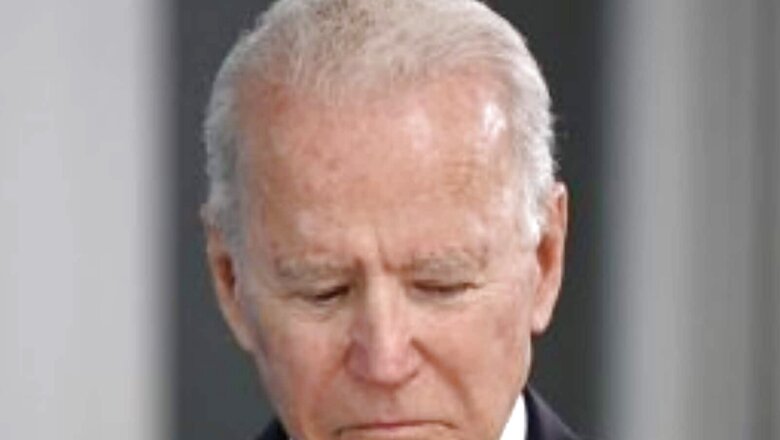
views
Scenes of desperate Afghans clinging on to an American military transport aircraft as it was taking-off from Kabul airport have become the defining image of the American debacle in Afghanistan. The ‘Kabul Moment’ is in many ways ‘Saigon Moment Plus’ and has grievously damaged the Biden presidency. The domestic fallout of the ‘Kabul Moment’ was so severe that President Joe Biden was forced to address the nation and defend the shambolic withdrawal from Afghanistan. The speech itself was a mixture of denial, doggedness and even decisiveness, an exercise in damage control which hasn’t really achieved its purpose.
What was most striking about the speech was that, among other things, Biden defended the decision to cut and run from Afghanistan on the ground that “our true strategic competitors — China and Russia — would love nothing more than the United States to continue to funnel billions of dollars in resources and attention into stabilising Afghanistan indefinitely”. This sounded a bit like Biden falling back on his bête noire Donald Trump’s slogan of “Make America Great Again” and putting “America First”. But hardly anyone is buying into the spin that the US President and his team are trying to give to the fiasco in Afghanistan.
What makes the position of Biden even more fraught is the fact that the evacuation process is nowhere near complete. The Americans are deploying more than double the number of troops they pulled out to securely evacuate the thousands of people out of the resurrected Emirate. For now, they appear to have an understanding with the Taliban to control the airport and flight operations for some days so that they can evacuate US citizens and the Afghans who worked for the US and could be in mortal danger if they stayed back. Other Western countries will also be using this time to pull out their citizens, officials, aid workers as well as the Afghans who were associated with them. The situation is clearly quite tense and everyone will be keeping their fingers crossed that things remain under control. Because if the situation spirals out of control, it will be a redux of the Tehran Embassy crisis in 1979, or worse, a repeat of what happened to the British while retreating from Afghanistan in 1842.
Even if the evacuation is pulled off without any hitch or glitch, Biden’s speech could come back to haunt his presidency in not too distant a future. For instance, he insisted that al-Qaeda had been “severely degraded in Afghanistan”. This is at best a half-truth. The fact is that the al-Qaeda remains active in the Af-Pak region and its bonds with the Taliban have become only stronger over the years. True, Osama bin Laden has been eliminated and many top al-Qaeda leaders have been caught or killed. But they have been replaced by others. If anything, al-Qaeda sees the re-establishment of the Emirate as its own victory. Reports out of Afghanistan reveal that many al-Qaeda operatives who were in Afghan prisons have been released and could become active very soon. Hundreds, if not thousands, of other Jihadists from around the region have also won their freedom from Afghan jails.
There are now real fears that not only will al-Qaeda become active, but also much more lethal, in Afghanistan. The same dynamic will also play out for other terror groups such as Tehrik-e-Taliban Pakistan (TTP), Uzbek and Tajik terror organisations and perhaps also the Chechen and Chinese (Uyghurs) terrorists.
While Biden admits that the terrorist threat has ‘metastasized well beyond Afghanistan’, the fact is that America’s defeat makes Afghanistan the safest of safe havens for most of these terror groups. Good luck with all this talk of ‘over-the-horizon’ capability because it is unlikely to work well on ground on account of the serious limitations associated with this strategy. Therefore, any attack on the American homeland, or on any of its allies, or even on countries like India, which is traced back to the Emirate, will be another nail in the coffin of America’s credibility.
Biden has been somewhat unfairly pilloried for saying that the “Afghan military collapsed, sometimes without trying to fight” and adding that “American troops cannot and should not be fighting in a war and dying in a war that Afghan forces are not willing to fight for themselves”. While the sacrifices made by Afghan forces over the last two decades are undeniable, it is also undeniable that the Taliban swept through Afghanistan because they faced hardly any resistance. Garrison after garrison either surrendered or simply melted away leaving the field open for the Taliban. Commanders switched sides, took bribes, accepted offers of safe passage, struck deals, and handed over the keys to the proverbial forts to the Taliban. There are many reasons and explanations for why this happened, but only some of them can be blamed on Biden’s decision to withdraw from Afghanistan as hastily as he did. Perhaps a more carefully planned withdrawal would have worked differently on ground. Or not. Who can say for sure? Even so, a lot of blame rests on Afghanistan’s feckless leadership, especially the abrasive and divisive, even foolish, president Ashraf Ghani, who was unable to rouse his nation and troops to resist the Taliban.
There is also no denying Biden’s assessment that “if Afghanistan is unable to mount any real resistance to the Taliban now, there is no chance that one year — one more year, five more years, or 20 more years of US military boots on the ground would’ve made any difference”. The fact remains that since around 2005, the Taliban have been resurgent and the US wasn’t winning. At best, it was a holding operation, but one in which the enemy was gaining ground every day. It wasn’t a stalemate because the Taliban footprint was expanding, even if not very rapidly. Simply put, the US was facing a creeping defeat. But the US generals were misleading the political leadership by giving cock-and-bull assessments of how they were winning when in fact they were losing.
Staying on in Afghanistan was only reinforcing failure because the US was not ready to take the war to the real enemy – Pakistan. On the contrary, US civilian and military officials were constantly appreciating the contribution of the Pakistanis even when they knew that the Pakistanis were shafting them. The problem was that the Americans were so clueless that while they thought heaping encomiums on Pakistanis would encourage them to ‘do more’, the Pakistanis used these compliments to not only not ‘do more’ but also pushback against the Americans by telling them that they had done whatever they could.
The post-mortem of America’s disastrous war in Afghanistan will keep happening. But what is more critical for the US right now is to restore its international credibility. Globally, US credibility has taken a severe beating. It is seen as an unreliable partner, one who will leave you in the lurch. Its adversaries such as China, Russia, Iran and Pakistan are having a field day lampooning it. Public opinion in countries that are aligned with the US is asking their governments to re-evaluate their relations with the superpower. From ‘America is Back’ to ‘America has shown its back’, the US has taken a major hit to its reputation.
And yet, the US remains by far the most powerful military in the world, the most technologically advanced country in the world, the biggest economy in the world. In short, it remains a superpower. Afghanistan, like many astute observers have noted, is not the graveyard of empires; it is the graveyard of Afghans – this was yet another thing Biden got wrong. The thing is that given the immense power America wields, most countries of the world will continue to look up to the US and seek closer relations with it to protect themselves, balance their adversaries, and profit from closer ties with the US. Exit from Afghanistan, howsoever ignominious, hasn’t materially altered the numero uno position of the US. In other words, whatever else the masses might say, those who call the shots in most countries will continue to seek closer cooperation and support from America. But this could start to change unless the US can demonstrate that crossing its path is the road to perdition and not paradise. If Biden can do that, especially by making a horrible example of countries like Pakistan, the US will re-establish its primacy and credibility; if he can’t, then Afghanistan will be seen as having sounded the death knell of Pax Americana.
The author is a senior fellow at Observer Research Foundation
(The views expressed in this article are those of the author and do not represent the stand of this publication.)
Read all the Latest News, Breaking News and Assembly Elections Live Updates here.



















Comments
0 comment